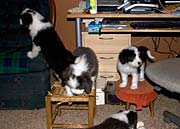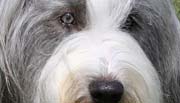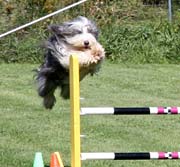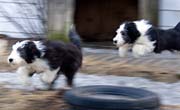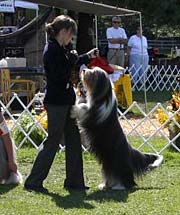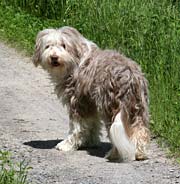Having a sense of humour is almost a requirement for Beardie ownership. Without it neither owner nor Beardie will be happy in the relationship. Beardies can be clowns, and their curiosity and cleverness often lead them into some pretty outrageous situations. Rather than recoiling in horror and getting upset, a Beardie owner would be better to appreciate the ingeniousness and talent that got the Beardie into the situation. Relating the story to other Beardie owners will, no doubt, result in a chorus of 'Did you get a picture?'!
As a general rule male Beardies tend to be softer natured, more affectionate, sweeter, and more 'doting' on their owners, while females are often somewhat more independent, with stronger personalities. The boys seem to love nothing more than to be petted and cuddled, while the girls will usually come and get their share of the attention and will then go off on their own when they've had enough. These are just generalizations, however, and there are certainly many independent males and lots of sweeter-than-candy females! In any given litter there might be the bossy boy, the soft girl, the independent girl, the laid back boy, the bratty girl, etc., so it's usually best to keep an open mind about male vs. female and get the pup whose temperament is best suited to you regardless of sex.
Most Beardies are enthusiastic, outgoing, and seem to feel that every person or animal exists solely to be a friend to them. Non-doggy people will not appreciate the typical 'Beardie greeting' these types exhibit! There are also those Beardies who are more cautious and reserved, checking out the situation or person thoroughly first before deciding whether they are worthy of their attention.

As an intelligent breed, Beardies are often acutely aware of everything around them, and how it all affects them. The absence of a clear leader to provide guidelines and rules to live by will have them attempting to fill that role themselves. This does not mean that you always have to be the 'big meanie' with Beardies, and can never spoil them or let them get away with a little mischief here and there (which is as far as I'm concerned one of the fun parts of having Beardies!), but before you let them break the rules you should be sure they know them. They should understand the difference between a privilege and a right. If they are allowed to get away with too much too soon, they may start feeling everything in life is their right, and will start dictating allowable privileges to you! If, for instance, you have no trouble grooming your Beardie and clipping its nails, and you know that your Beardie will, without quarrel, get off your bed when you tell it to, then you likely have a well adjusted, properly raised Beardie who can be allowed more of the 'spoils' than a Beardie who fights grooming and reacts with bared teeth at the request that you'd like to make the bed now so please move!
Beardies can be notoriously sound sensitive, as it seems many herding breeds are. Thunderstorms, for instance, often result in a shivering Beardie looking for the most out of the way cubbyhole to hide in. Proper handling of a Beardie's introduction to loud noises is of paramount importance. Coddling and baby talk only serve to reinforce the fear. A young Beardie will take his cue from the owner, so that an indifferent or lack of reaction from the owner is usually enough to make the pup realize that there isn't anything to be scared of. Vacuums, dishwashers, blenders, etc. are all part of most peoples' lives, and that is how most Beardies should learn to regard them. As an example, if a pup shows an initial fear reaction to the vacuum, do not stop vacuuming and go and pet the scared puppy, but also don't force the pup to come and stand right next to this new scary monster machine. For the most part simply ignore any reaction by the pup, or if you feel you must do something engage the pup in an exuberant play session. Some Beardies develop seemingly irrational fears of other things, and this often starts at adolescence. The 'teenage' stage can be a confusing and insecure stage for a Beardie, and a previously confident, outgoing pup can suddenly become scared of its own shadow. Proper handling through this stage is important, taking care to avoid overly stressful or fear inducing situations (for instance putting dog shows on hold for a while,) while continuing regular outings and socialization.
Beardies are a herding breed, and many retain the herding instinct. This can manifest itself in inappropriate 'herding' of cats, kids, or whatever, and when the desired result is not achieved a well-placed nip may follow. It is important to teach young puppies bite inhibition. All pups will grab, nip, and bite, and if not taught the proper limits of this behaviour they will grow up to be adults who grab, nip, and bite, often quite hard. When a pup plays with its littermate, it is learning how hard it can bite. Bite too hard and the other pup will squeal and stop playing. The pup learns that if he bites too hard it hurts and play stops. Transferring this to people, if the pup bites you too hard (and it doesn't take much force for those needle sharp baby teeth to cause pain) squeal like the littermate would and ignore the pup. He'll learn that humans are really sensitive and he has to be really gentle!
Beardies are not generally a 'yappy' breed, but some do appear to like the sound of their own voice, and if not taught otherwise some individuals will bark excessively. For many dogs barking is quite enjoyable. It's important to remember that barking, among other behaviours, is a perfectly normal behaviour for a dog. If you are the type to insist your dog never bark, then a Beardie is not the dog for you. A better approach to problem barking is to channel it into appropriate times or situations. Teach it when barking is permitted, and when it is not. Many excessive barkers have actually been taught this behaviour, albeit unintentionally, by their owners. Example: Dog barks, owner yells, dog thinks owner is barking along so barks more, frazzled owner finally either lets dog out, or gives dog a toy or a cookie to shut him up. Result, dog has taught owner to reward him when he barks!
For more tips on raising and training a pup of this clever breed, visit the Training page, and the Raising Your New Puppy page.








